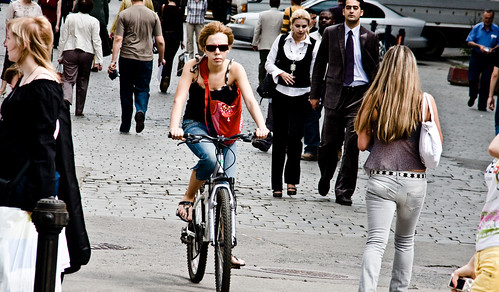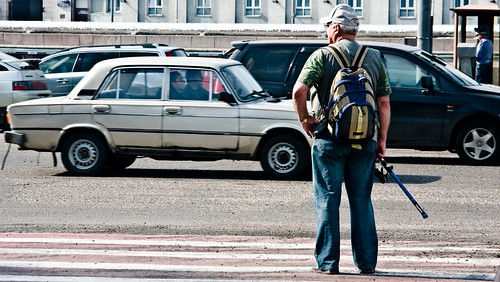
Moscow Cyclist - from the Moscow Cycle Chic photo set.
The Russian president Medvedev has just wrapped up a state visit to Denmark. During the back slapping/see-we're-best-of-friends press conference about all matter of stuff, a Russian journalist asked a question that caused both the Danish PM and the Russian president to smile.
The woman asked PM Lars Løkke Rasmussen about the many cyclists in Copenhagen, "How hard was it, from an investment perspective, to make Copenhagen a bicycle-friendly city?"
She then asked Medvedev what his opinion was about the bicycle as transport, as she was puzzled by seeing so few cyclists on the streets of St. Petersborg.
The PM gave all the credit to the City of Copenhagen for the high level of cycling in the city and underlined that it was an effort that has taken several years.
"But basically, it is the public's demand for bicycle infrastructure that makes it happen. Danes want to cycle and that puts pressure on cities to make it happen", said Lars Løkke Rasmussen.
He added that he had spent his summer holidays last year to cycle from Denmark to Paris and that he noticed that "the Danish bicycle infrastructure is superior to anything you'll find in the rest of Europe." [Ed: Feel free to rip THAT one apart, my fine Dutch friends, with my support. Because it's quite a silly comment... perhaps he didn't ride through the Netherlands.]
Medvedev answered that he was a big supporter of cycling and he told the story of the time he saw the prime minister in another country arrive at a meeting by bicycle. It impressed him.
"It's correct that Russia isn't very advanced regarding bicycle culture. We have another transport culture. We need bike lanes but the motorists don't always behave as we would like them to. Many motorists don't understand what a cyclist is doing on the road. I would like to see more bicycle lanes in St. Petersborg", he said and added that Russia had a lot to learn from Denmark.

Urban Immobility in Moscow.
Via: JP.dk. Thanks to Rasmus for the link.